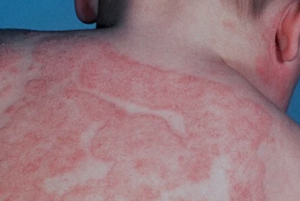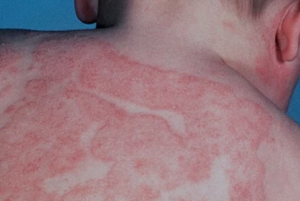ECZEMA
-A medical condition in which patches of skin become rough and inflamed with blisters which cause itching and bleeding.

What is eczema? What does it look and feel like?
Eczema (also called atopic dermatitis) is a condition that causes your skin to become dry, red, itchy and bumpy. It’s one of many types of dermatitis. Eczema damages the skin barrier function (the “glue” of your skin). This loss of barrier function makes your skin more sensitive and more prone to infection and dryness.
Eczema doesn’t harm your body. It doesn’t mean that your skin is dirty or infected, and it’s not contagious. There are treatments that can help manage your symptoms.
In the word “dermatitis,” “derm” means “skin” and “itis” means “inflammation.” The word as a whole means “inflammation of the skin.” “Eczema” originates from the Greek word “ekzein” which means to “boil over” or “break out.”
How common is eczema (atopic dermatitis)?
Eczema affects up to 15 million Americans. Infants are prone to eczema and 10% to 20% will have it. However, nearly half outgrow the condition or have significant improvement as they get older.
Eczema affects males and females equally and is more common in people who have a personal or family history of asthma, environmental allergies and/or food allergies.
How does eczema start?
The first signs of eczema are itchiness and redness.
Where does eczema most commonly occur?
Eczema can show up anywhere on your skin. In teens and adults, it’s typically found on your hands, neck, inner elbows, ankles, knees, feet and around your eyes.
Who is at risk of getting eczema?
Eczema (atopic dermatitis) usually begins in childhood, but anyone at any age can get it. You’re high risk if you are:
- Female.
- African American.
- Diagnosed with hay fever or asthma.
- Part of a family with a history of dermatitis, hay fever or asthma.
Is eczema (atopic dermatitis) contagious? Can it spread?
No. No type of dermatitis is contagious. It can’t be spread to anyone else.
Does eczema hurt? Does it burn?
Although some types of dermatitis are painful (contact dermatitis, for example) or cause a burning sensation, eczema is usually itchy.
Can eczema hurt the rest of my body, or kill me?
Eczema and other types of dermatitis are not harmful to the rest of your body. The condition is not deadly.
What’s the difference between dermatitis and psoriasis?
Psoriasis and dermatitis can appear similar. Both cause patches of red skin. However, in psoriasis, the scales are thick and the edges of those scales are well-defined.
Discuss with your healthcare provider your questions about which type of skin condition you have. You can have more than one skin condition at a time. Treatments for one may not work for the other.
SYMPTOMS AND CAUSES
What causes eczema?
Eczema (atopic dermatitis) is caused by a combination of immune system activation, genetics, environmental triggers and stress.
- Your immune system. If you have eczema, your immune system overreacts to small irritants or allergens. This overreaction can inflame your skin.
- Your genetics. You’re more likely to have eczema if there is a history of dermatitis in your family. You’re also at a higher risk if there’s a history of asthma, hay fever and/or allergens. Allergens are substances like pollen, pet hair or foods that trigger an allergic reaction. Also, there might be a change in your genes that control a protein that helps your body maintain healthy skin. Without normal levels of that protein, your skin will not be completely healthy.
- Your environment. There is a lot in your environment that can irritate your skin. Some examples include exposure to tobacco smoke, air pollutants, harsh soaps, fabrics such as wool and some skin products. Low humidity (dry air) can cause your skin to become dry and itchy. Heat and high humidity can cause sweating and that can make the itchiness even worse.
- Your stress. Your stress levels can cause or worsen your eczema. There are mental/emotional signs of stress and physical signs of stress. They include:
Mental/emotional signs:
- Depression.
- Difficulty relaxing.
- Use of alcohol, tobacco, or illegal drugs to relax.
- A negative opinion of yourself (low self-esteem).
- Anxiety, constant worry.
- Feeling overwhelmed.
- Difficulty with concentration.
- Irritability, mood swings, or a short temper.
Physical signs:
- Nausea and dizziness.
- Not wanting to have sex.
- Sleeping too much.
- Sleeping too little.
- Diarrhea.
- Constipation.
- Muscle tension.
- Aches and pains.

What are the signs and symptoms of eczema?Eczema (atopic dermatitis) symptoms include:
- Dry skin.
- Itchy skin.
- Red rashes.
- Bumps on the skin.
- Scaly, leathery patches of skin.
- Crusting skin.
- Swelling.
If you have eczema, you might also have another condition that doesn’t cause it, but is often found alongside it:
- Allergies.
- Asthma.
- Depression.
- Sleep loss.
- Anxiety.
Notice that diabetes is not included in this list.
Does the weather make eczema worse?
Low humidity (dry air) can dry out your skin, and sweating caused by high heat can make the itchiness worse.
How long does eczema (atopic dermatitis) last?
Eczema can be lifelong, but symptoms can be managed with at-home remedies, over-the-counter medications and prescribed medications.
TREATMENT;
You and your doctor should discuss the best treatment plan and medications for your atopic dermatitis. But taking care of your skin at home may reduce the need for prescription medications. Some recommendations include
- Avoid scratching the rash or skin.
- Relieve the itch by using a moisturizer or topical steroids. Take antihistamines to reduce severe itching.
- Keep your fingernails cut short. Consider light gloves if nighttime scratching is a problem.
- Lubricate or moisturize the skin two to three times a day using ointments such as petroleum jelly. Moisturizers should be free of alcohol, scents, dyes, fragrances, and other skin-irritating chemicals. A humidifier in the home also can help.
- Avoid anything that worsens symptoms, including
- Irritants such as wool and lanolin (an oily substance derived from sheep wool used in some moisturizers and cosmetics)
- Strong soaps or detergents
- Sudden changes in body temperature and stress, which may cause sweating
- When washing or bathing
- Keep water contact as brief as possible and use gentle body washes and cleansers instead of regular soaps. Lukewarm baths are better than long, hot baths.
- Do not scrub or dry the skin too hard or for too long.
- After bathing, apply lubricating ointments to damp skin. This will help trap moisture in the skin.
Wet Wrap treatment
Researchers at NIAID and other institutions are studying an innovative treatment for severe eczema called wet wrap therapy. It includes three lukewarm baths a day, each followed by an application of topical medicines and moisturizer that is sealed in by a wrap of wet gauze.
People with severe eczema have come to the National Institutes of Health Clinical Center in Bethesda, Maryland, for research evaluation. Treatment may include wet wrap therapy to bring the condition under control. Patients and their caregivers also receive training on home-based skin care to properly manage flare-ups once they leave the hospital.
